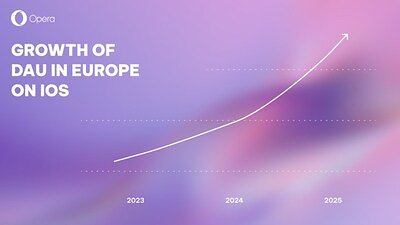
Opera Browser Gains Traction as EU's Digital Markets Act Shifts Competitive Landscape
Opera is seeing a surge in users and revenue following the implementation of the EU’s Digital Markets Act, challenging the dominance of Chrome and Safari. Is this the start of a new era for browser competition?
Opera Browser Gains Traction as EU's Digital Markets Act Shifts Competitive Landscape
Oslo, Norway – November 13, 2025 – Opera, the Norwegian software company, is experiencing a significant uptick in user growth and revenue following the implementation of the European Union's Digital Markets Act (DMA), signaling a potential shift in the competitive landscape of the web browser market. While Google Chrome and Apple’s Safari continue to dominate, Opera is capitalizing on the DMA’s efforts to foster competition, offering users greater choice and challenging the status quo.
For years, the browser market has been largely controlled by two tech giants. The DMA, which came into effect in March, aims to prevent these companies from leveraging their market power to stifle competition. A key component of the act requires gatekeepers – large online platforms – to allow users to easily uninstall pre-installed apps and change default settings, including web browsers. This newfound ease of switching appears to be benefiting Opera.
DMA Fuels User Growth and Revenue Surge
Opera reported a 23% increase in revenue for the first quarter of 2024, reaching $151.9 million. This growth is accompanied by a substantial rise in active users, particularly in the European Economic Area. The company attributes much of this success to the DMA, which has lowered barriers to entry for alternative browsers.
“The DMA is a game-changer,” said one industry analyst. “For years, users have been locked into default browsers due to the difficulty of switching. Now, they have genuine choice, and Opera is well-positioned to take advantage of that.”
While Opera’s overall market share remains smaller than Chrome and Safari, the rate of growth is notable. The company has consistently focused on features that differentiate it from its rivals, including a built-in VPN, ad blocker, and crypto wallet. These features appeal to privacy-conscious users and those seeking a more streamlined browsing experience.
Beyond Defaults: Opera’s Diversified Strategy
However, the DMA isn’t the sole driver of Opera’s success. The company has strategically diversified its revenue streams, moving beyond traditional advertising to include search advertising and performance-based marketing. “They've been building a resilient business model that's less reliant on being the default browser,” explains a source familiar with Opera’s financial strategy.
Opera Ads, the company’s advertising platform, is a key component of this strategy. By offering personalized advertising within its browser and other products, Opera is generating revenue without compromising user experience. This approach has proven particularly effective in emerging markets where users are more receptive to advertising in exchange for free services.
“They've found a sweet spot between monetization and user experience,” one analyst commented. “They're not just shoving ads in people's faces; they're offering relevant and engaging content.”
Competition Heats Up: Responses from Google and Apple
Despite Opera’s gains, Google and Apple aren't standing still. Google is actively implementing changes to comply with the DMA, including offering users more choice over default browser settings. Apple, while complying with the letter of the law, has also introduced safeguards it claims are necessary to protect user privacy and security.
“Apple is walking a tightrope,” said another industry expert. “They want to comply with the DMA without completely dismantling their ecosystem.”
While Apple has streamlined the process for changing default browsers on iOS, it has also implemented restrictions that some critics argue stifle competition. Google, similarly, is taking steps to ensure its products remain competitive while adhering to the DMA’s requirements.
Beyond Opera: A Rising Tide for Alternative Browsers
Opera isn’t the only beneficiary of the DMA. Mozilla Firefox has also reported a significant increase in active users in Europe, particularly in Germany and France. Smaller browsers like Aloha are also experiencing a surge in popularity.
“The DMA is creating a more level playing field for all alternative browsers,” explained a representative from a privacy-focused browser company. “For years, we've been fighting an uphill battle against the dominance of Chrome and Safari. Now, we have a fighting chance.”
The increased competition is ultimately benefiting users, who have more choices and greater control over their browsing experience.
Financial Health and Future Prospects
Opera’s financial performance continues to impress analysts. The company’s revenue has grown by an average of 23.6% per year for the past five years, and its operating margin is steadily increasing. The Rule of 40 metric, a benchmark for assessing a company’s financial health, is consistently met, indicating strong growth and profitability.
Analysts predict that Opera’s growth will continue in the coming years, driven by its diversified revenue streams, innovative features, and the ongoing impact of the DMA. The company is also investing heavily in new technologies, such as AI-powered browsing assistants, to further differentiate its products and enhance user experience.
“Opera is well-positioned to capitalize on the changing dynamics of the browser market,” one analyst concluded. “They’ve built a resilient business model, and they’re not afraid to innovate. They are a company to watch.”
Opera’s story serves as a compelling example of how regulatory intervention can foster competition and benefit consumers. As the DMA continues to reshape the digital landscape, it remains to be seen whether other companies will follow Opera’s lead and challenge the dominance of the tech giants. However, one thing is certain: the browser market is undergoing a period of unprecedented change, and the future of web browsing is more competitive than ever before.
